Straggler behind the Fed and the ECB gets the drift.
Total assets on the balance sheet of the Bank of Japan at the end of April ticked up from March but were flat with the record in February: ¥562 trillion ($5.1 trillion). This amounts to a gigantic 102.2% of nominal GDP. But the BOJ has been tapering its asset purchases since peak QE at the end of 2016, and the growth has slowed to a snail’s pace, by Abenomics QE standards.
Despite the BOJs repeated promises of adding ¥85 trillion to its balance sheet every year, the BOJ hasn’t done that since peak QE in 2016 when it added ¥93 trillion. The additions have consistently decreased since then. Over the 12 months through April, it has added merely ¥27 trillion, the lowest 12-month increase since early days of ramping up Abenomics in March 2013. This amounts to a stealth taper:
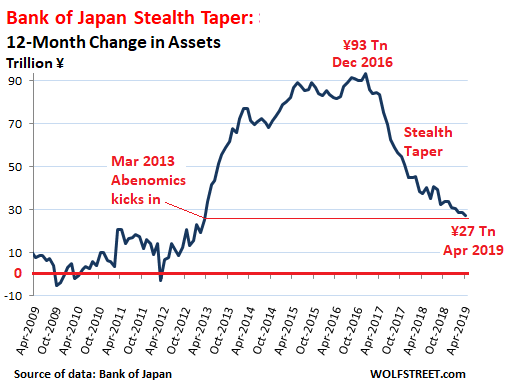
Meanwhile, the government of Japan has been borrowing and issuing new debt with reckless abandon, and the gross national debt outstanding has ballooned to ¥1.12 quadrillion, or 203% of nominal GDP (measured in yen).
But no problem: the BOJ started buying every Japanese government security that wasn’t nailed down, with the government selling new securities to the banks, and the banks selling them to the BOJ for a small profit. In addition the BOJ mopped up what was coming on the market. The BOJ now holds 43% of all outstanding Japanese government securities, up from 25% in January 2015.
These massive purchases of Japanese government securities, and to a lesser extent, the purchases of corporate bonds, equity ETFs, and Japan REITS, have created this enormous balance sheet, but note the flattening spot at the top, a result of the stealth taper:
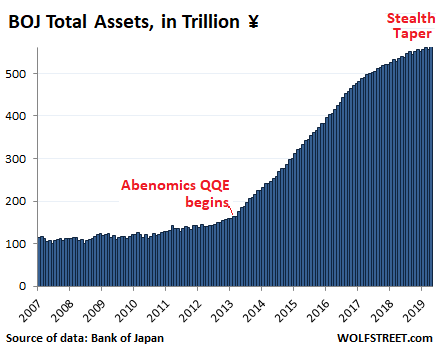
The stealth taper has reached a level to where the assets added to the balance sheet are small enough that every third month, as long-term securities mature and roll off the balance sheet, the balance sheet shrinks. Then the next two months, the balance sheet gains:
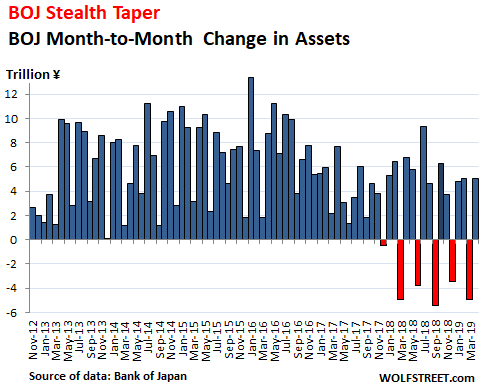
To smoothen out this volatility of the balance sheet and delineate the trend of the stealth taper more clearly, I converted that above data of month-to-month change into a rolling three-month average. The addition in assets over the past six months was ¥1.7 trillion a month on average:
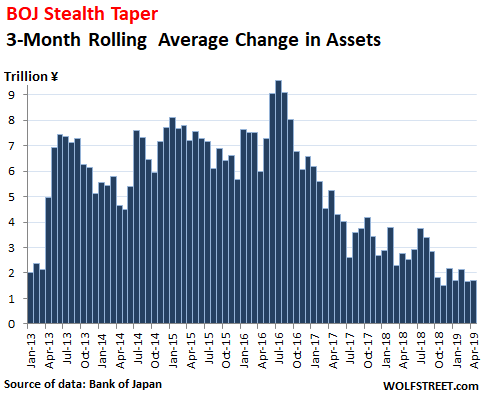
This addition of ¥1.7 trillion a month on average over the past six months amounts to an annual rate of growth in assets of ¥20 trillion. And this didn’t change despite the selloff in stocks late last year. So regardless what the BOJ claims about its program of adding ¥85 trillion in assets a year, it has trimmed its net additions down to a rate of about ¥20 trillion a year over the past six months – less than a quarter of the announced QE program, and the lowest since Abenomics kicked in.
The BOJ’s stealth taper lags what the other major QE-meisters, the ECB and the Fed, are doing.
The ECB’s balance sheet, at a gigantic €4.68 trillion ($5.3 trillion), is in dollar terms at current exchange rates, the fattest in the word. It amounts to 40.3% of Eurozone GDP. But it has been essentially flat for the past five months, as the ECB has followed through on its promise to stop QE in December:
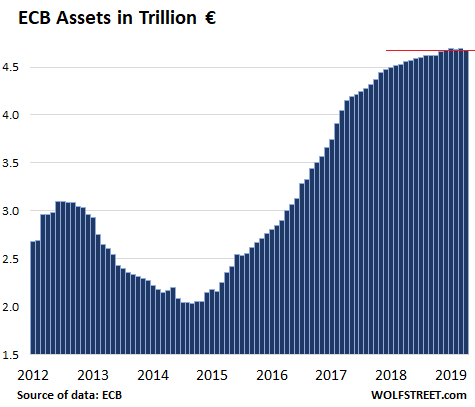
And the Fed’s balance sheet has been shrinking since October 2017 and is now down to $3.89 trillion, or 18.5% of GDP, compared to the ECB’s $5.3 trillion (40.3% of GDP) and BOJ’s $5.1 trillion (102.2% of GDP):
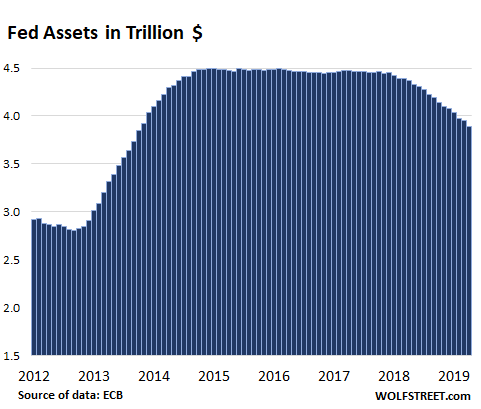
The Fed shed $46 billion in assets in April, as its total QE unwind reaches $580 billion. Assets drop to lowest level since November 2013. Read… Fed’s QE Unwind Continues at Full Speed in April
Enjoy reading WOLF STREET and want to support it? You can donate. I appreciate it immensely. Click on the mug to find out how:
![]()


Nothing desperate about the last 5-6 years of Central Bank purchases, and no doubt this will end without event.
Good fun watching CB’s go to such extremes trying to keep their precious system afloat as long as possible.
But how is the growth rate , which all this stimulus were supposed to increase and support ??
In the USA yeah ok maybe. The dow is back near 26.000.
But in the Euro zone, where I live ?? The economies work in sloooow motion.
Italy?? France..?? Brexit coming.
And the debate of sustainability of our eco systems.
Interesting times indeed.
Well that’s monetary policy. Here in the states we create the illusion of growth by going hog wild on fiscal policy. In the last year alone the deficit went from 3.8% of GDP to 5.1% of GDP.
That has more to do with not collecting revenue from the 1% than it has to do with spending.
That’s the primary rationale of GOP tax policy. Broaden the deficit by reducing revenue, then swing wildly at Democrats for their out of control spending on the usual programs, then push for dramatic cuts to those programs while increasingly stimulating national security spending, while maintaining their posture as deficit hawks. It’s like the political version of the hokey pokey. And Democrats fall for it every dsmn time. Why? On fiscal & financial industry matters they’re on the same side.
The punch line to the joke is that Trump has turned out to be the biggest tax and spender of all time. Throwing massive amounts of money at the military and overriding Congress to fund his domestic pork project. Just remember, Tarriffs are Taxes Too. By election day, Trump’s Tarriff Taxes will overwhelm the small tax relief that anyone except the billionaires got.
According to Forbe’s lastest 400 tally their net worth is estimated at $2,700,000,000. So after it’s all confiscated by the government I wonder where the money for the remaining 5 months of the year is going to come from. Social Security, Medicare,Medicaid,Interst on the Dept and Federal and Military pensions are driving the budget and are 100% on autopilot. Please wake up.
Yes it is monetary policy. But the idea of QE is to keep interest rates low, and thus make investments more attractive than buying bonds .
What has been the reality? Housing bubbles and overpriced stocks.
The longevity of the equity market rise also includes some of the results (real and/or perceived) of buybacks & M&A. In a way it’s reminiscent of other times when prices were manipulated by a small group who create the lows and the highs in prices, like RCA in the 1920s (?). Now, too with the fed seemingly having heard the low interest rate yearnings of the White House, perhaps there’s no internal way through non-accomodative monetary policy to pop the bubble. Is it possible we’re actually near a deflationary “bubble” with an economy unable to generate inflation? Thus the fed’s dilemma. How to get the economy moving anywhere near sustainability when it’s hard to get money moving well in the so-called real economy of goods production when the low interest game is all in on financial products. Then there’s tariffs, corporate debt, etc. Status: swimmingly perfect.
@Michael Matheron
>Is it possible we’re actually near a deflationary “bubble” with an economy unable to generate inflation?
CPI-U Y/Y is at 2%, CPI-U less food and energy is 2.1%. Though I know PCE inflation is running lower. I don’t particularly like PCE inflation because it is chained. They are assuming that I will buy a cheaper beer because the beer I like has gotten more expensive. Obviously they don’t know squat about beer.
https://en.wikipedia.org/wiki/Personal_consumption_expenditures_price_index
“In comparison to the headline United States Consumer Price Index (CPI), which uses one set of expenditure weights for several years, this index uses a Fisher Price Index, which uses expenditure data from the current period and the preceding period. Also, the PCEPI uses a chained index which compares one quarter’s price to the previous quarter’s instead of choosing a fixed base. This price index method assumes that the consumer has made allowances for changes in relative prices. That is to say, they have substituted from goods whose prices are rising to goods whose prices are stable or falling.”
Spot on Frank. Identified years ago as the problem by others (Prof Richard Werner, Prof Stee Keen, and others). The Goldman Sachs (Mario Draghi/Bob Bernacke/Mark Carney GS trio) model seems to work well for GS and those who know how to game the market, but it will always lead to boom & bust scenarios.
So the BOJ is saying A whilst doing B.
How unusual.
only the informed who know how to read charts, and bother to look, would observe this.
The BOJ know’s, if the system/market is told, the sugar bowl is being removed, it will misbehave.
So simply allow it to stand empty for periods, then partially refill it, before tears erupt.
Long term same normalisation effect.
I wonder if anyone even noticed, the 3Y, 10Y, and the 30Y SOMA Reinvestments were the largest ever recorded. And, we say we’re not on QE. Absurd, the news is all about the lowest bid to cover ratio seen on the 10Y. Talk about the real stealth.
It’s early Sunday morning. I’m sitting here trying to wake up while reading Twitter, Wolfstreet, etc.
When I read the last paragraph in this article I got a jolt that brought me out of my morning stupor.
The Fed shed 46 TRILLION in assets… total unwind 580 TRILLION.
Wow! We’re in better shape than I thought. Or maybe we’re in worse shape. Can’t figure it out right now. It’s too early
Yeah, I had used billion instead of trillion in a couple of spots further up, and readers pointed that out, so then I fixed it, but it was late at night, so I searched for all billions and converted all of them to trillions, including the last two. Trying to fix one error and creating a new error in the process. I should stay away from a keyboard when it gets this late :-]
As a group we’re caught in the shock effect of the “quantum” jump shock from baselines that for decades viewed billion as a “lot” of money. The effect is akin to, in a sense, fighting the “last war,” in military jargon. For example, how many times do we hear that the Mueller investigation “cost taxpayers tens of millions of their dollars”? On average taxpayers express outrage at this high cost, yet in a multi-trillion dollar “tens of millions” is de minimus, BUT among those over, say, 40, “millions” is a hell of a lot of bucks! I think this large value effect takes time to calm to a point where “trillion” exerts just the correct mental effect on most persons as did “billions.” Who cares? To the extent that we now in public funding of small dollar programs if merit argue about a few million here and there the large dollar effect has policy implications. Conversely, since we are having problems even imagining what “a trillion” of anything actually is (other than some thing yet to be defined) we actually pay less attention to truly large budget items that need discussion.
Next up is the quadrillion and trillion combo ;)
Soon billion will be old news…..
When the Central Bank of a third world country has a balance sheet bigger than 5% of the country’s GDP we sneer at it. “It’s a third world country. What would you expect”.
When a CB in the developed world does it, we look at their boards as if they were financial geniuses.
No one knows what a global monetary contraction will look like. If you have ten people who use ten bbls of oil a day, and now they only need five, (each of them buys one bbl each, each day) you have a surplus of five, but if you have a hundred, and everyone still buys one bbl at a time, you have problems. The crisis centers on the market pricing mechanism.
The Bank of Japan should buy 102% of the annual debt and then forgive it. Then the government would have a surplus…
Currency is a confidence game. If people lose trust in the currency, well, see what has been happensing in Argentina. It gets very difficult to have a sound economy if the participants in that economy lose trust in that economy’s currency. Destroying a currency is a ruinous experience.
The Bank of Japan and the Japanese government are very aware of that. They’re treading a fine line for as long as they can. But a big misstep, of the type you describe, would put them squarely on the other side of that fine line, for all to see.
Japan (and the Fed and the ECB and the PBC) have already crossed that fine line. They made government funding almost free and governments responded by growing enormously and budgets have exploded. Once government budgets grow they can never shrink because to do so would cause a severe economic downturn so government spending continues to grow and grow and CB funding keeps pace. Soon the government is employing such a large and unproductive work force (including defense contractors) that society becomes dangerously unproductive, prices rise, setting off a panic and all the trillions created by Ben suddenly become desperate for anything to exchange for digits in an electronic account – panic ensues and the currency collapses.
People often bring up Argentina but I think Brazil provides a better test case. The government in Brazil printed money for years and people said the currency would never crash because the economy was growing. After years of money printing without a currency collapse the naysayers were completely discredited until prices started to rise persistently and panic hit and it was all over.
It doesn’t work, you can’t print wealth. All that money Ben printed is just massive dry kindling waiting for the spark of a panic, when that happens we will have a major conflagration. It’s too late now, it’s going to happen. Maybe not soon but it will happen, Ben crossed the Rubicon and the die has been cast.
I concur with your analysis and outcome. Well presented.
We can see this already with the $trillion dollar deficits; the government is telling us 700B but real deficit is over 1T.
They can’t/won’t reduce it. Significant cuts would put the country in a steep recession or depression.
The deficits fund the defense contractors and military so we can strong arm the rest of the world to accepting the dollar.
The deficits throw enough crumbs to the working poor so they can scrape by. Of course what this is doing to the values and psyche and as you say, productivity of our country is devastating.
The crisis when it comes will be terrifying. One can only hope that true leaders step in and make the changes necessary to put us back on solid (albeit poorer) footing.
A circular loop where the BOJ buys the government securities and makes a profit and recycles them again? Why have a market mechanism when the BOJ and the government can buy and sell government securities from each other with the BOJ making an automatic profit. No market needed.
That is in essence what is happening. The BOJ remits its profits (from interest that the government pays on the JGBs that the BOJ holds) back to the Ministry of Finance. So it’s all the same. The small profits that banks make is good for the banks that are having a hard time in a NIRP environment.
But you have to have a market, because that’s what keeps the bombers away. If you didn’t have a market, then Trump would declare these to be state subsidies and start a trade war with you and you’d be in the same boat with China and Venezuela and you’d be searching the blue skies for the bombers that are about to blow up your city. Having a market keeps the bomber-capitalists happy or at least away.
But be careful not to slip and use the out-dated term of a free market. The Trumpers would hear the word free and think you are socialists and bomb you. Meanwhile the corporations and rich who really run things would hear free market and think of evil competition in their monopoly world, and they’d want to bomb you to. So, have a market to keep the bombers away, but stay away from dangerous words like free.
Very well put. A free market is the very last thing we need now. It would instantaneously incinerate, nay vaporise, all that dry kindling Van mentioned.
Oh, and to those wondering why some countries’ “bad” economic policies lead to disaster while other nations seem rather more “robust”, Perkins’ “Economic Hit Men” is as current as ever.
Japan is “stealth tapering” their money manufacturing… yawn. Japan is on course to totally destroy their currency and nothing can reverse that process. The level of funny money fabrication may fluctuate at times but it will never stop – the Yen is destine for zero as sure as water swirls down a drain. Japan is forced to print Yen to pay the bills, without exception this leads to hyperinflation.
The U.S. is suffering the same fate. The Fed assures the government they can continue to run deficits equal to 1/4 to 1/3 of the total budget but never worry about funding. As Ben Bernanke stated explicitly: the U.S. government will never default on its debt in nominal terms – which is to say the Fed plans to allow the U.S. government to default by hyperinflation. That was the plan Ben laid out and the plan has not changed now that Powell is our overlord.
All the CB machinations and jaw-boning are nothing more than a tale told by idiots, full of sound and fury, signifying nothing. In the end we are left with nothing as the wealth many worked so hard to accumulate slips through their fingers.
What will become of our economy after money is worthless? How will we sustain a $20 trillion economy without a functioning currency? I will lose everything in the coming crisis but I’m fascinated to watch the train wreck.
For 250 years, the financiers of Japan maintained a completely bankrupt administration.
VERY SCUCESSFULLY until Americans came and forced them to open their economy to AMERICAN TRADE, at gunpoint, as usual.
The result after 250 years of peace. Japan was again cast back, into civil war.
80 plus years later on an early december morning the reverberations of that unprovoked American invasion were felt in the American Hawaiian Islands.
Believe the BOJ knows a lot more about what it is doing, and says a lot less. Than America ever will.
America still teaches that “the American way, is the wright way, therefor, the only way”.
Hence America is part of the global problem’s, not part of the solution to any of the global problem’s.
Wolf, I do not doubt your numbers but the ‘tapering’ does not show in interest rates. In Japan and Germany the rates for ten year bonds are negative. Does any real investor buy that debt in sufficient quantity to keep the rates at -0.05% for ten years?
Both the ECB and BOJ have negative policy interest rates. So short-term rates are negative because of that. Longer-term rates follow more or less follow.
Hi Van,
you write:
‘In the end we are left with nothing as the wealth many worked so hard to accumulate slips through their fingers.’
The wealth will still be there. The land, the people, the water, the air, the crops, the labor, the buildings, the culture, the water, the music, the cuisine. Your barber will still cut hair and your dentist will still clean your teeth. It’s the claims on that wealth that will fail. It’s like a market cap; only a small percentage of stocks actually trade, but ALL holders of that stock re-value their ‘net worth’ accordingly. The same is true with a currency. Someone with 5 million in the bank thinks they have a house and a nice retirement just waiting for them at a moments notice because their co-worker did it. But there are not enough ‘set-for-lifes’ to go around at that price. When the currency loses the people’s trust, and it will, what’s lost is nothing but that currency. The house and the retirement were a fantasy. So no wealth will be lost…only people’s misplaced trust and their illusions of what they believed they had.
Such an explanation will not soothe anyone who lost a ‘fortune’ to currency debasement. but I offer it as an alternative way of looking at the same thing.
You say :
“When the currency loses the people’s trust, and it will, what’s lost is nothing but that currency”.
All major currencies are measured against each other. People ( Jim Grant, Richard Russell, etc.) have been waxing lyrical about the US dollar demise for longer than the 20 years i have been hearing about it.
The $ is stronger now more than ever.
So i suppose the more things look like they are going to change, the more they stay the same. Do not worry. All is well.
yeah you are right about the timing. and justified in rolling your eyes. but the question, as relating to conversations further up the thread, is at what point do you get nervous? a million used to be a big number. a billion used to be a big number. soon a trillion will become a small number. if ‘its all relative’ and the number doesn’t matter, only the ratio to other currencies matters, then you’re ok so long as you are earning money. but then comes the problem of those pesky savers. this is where the battle for reality takes place. savers that need a yield, by definition, must put their money at risk. but that is the antithesis of saving, safety or safe-haven. Savers are seen as the enemy because they do not encourage credit expansion and drives the dollar up making debt-repayment difficult. They are seen as the enemy and will be dealt with by devaluing what they save in i.e. the dollar and dollar debts. So yeah, ‘All is well’ trading in dollars but you can’t ‘put it under the mattress’ for a rainy day. which is all most working people really want to do.
“The $ is stronger now more than ever.”
Completely incorrect. Find yourself a long term chart.
With the ending of the gold standard all currencies are moving relative to each other depending on what country has to trade, be it: primary resources; manufacturing; R and D and so forth. The USA is well placed in all departments and crucially is self-sufficient in energy for ~20 years due to the fracking revolution. Energy underpins everything. So USA should be solid relative to other countries for the medium term.
Energy is the master resource and any real evaluation of its future is dire. Wall Street has removed the the milk and honey tit from the frackers and most likely we get a combo of shortage or massive price increases as few if any are making a positive return. Government subsidies for Bio-Diesel are forcing edible oil basis up significantly as many plants/producers are taking the goobermints hand out and planting and processing more oilseeds. This is all to cover up the significant reductions of diesel production as it doesn’t exist in much of the heavy oil now being processed in the U.S. That anyone expects the party to last another 20 years is beyond rational thought. (Anyone old enough remember when diesel sold at a large discount to gasoline?)
Below market costs for money continues to also subsidize and borrow from the future. The massive debt now at all levels of consumer, government and business is the flashing red light that signals the parties over. Excess is crippling. That anyone can suggest that price inflation is less than 8% and growing is in denial. While home price inflation seems to have subsided how many of us are buying new homes each year? Consumables, Utes, Taxes, Consumer Interest Rates, and Services are marching/or are significantly higher. Major changes in weather aka the Grand Solar Minimun are affecting weather and thus lowering food production significantly due to cooler weather and at present much higher precip. IMO suggesting we are sitting in the catbirds seat is naive. The Military Industrial Clown Act is once again leaning on guns or butter as the final arbitrator of resources. Guess who loses on that front? We all need to remember “Less is More” as the new thought control paradigm.
Except the fundamental role of currency is to act as on intermediary for wealth transfer. For someone saving, it represents potential wealth. If you’ve been working for thirty years and your retirement becomes suddenly worthless, you HAVE lost wealth that you were setting aside for later in life.
In that case you saved in a ‘claim on wealth’. An IOU for wealth, not wealth itself. This is my point. Do NOT save in another’s debt. Thats called investing, not saving. These people are seeking a yield, but when it comes will provide little nourishment. Money is a bad way to save.
Since we are on the topic of Japan where the central banks buys almost all of the country’s debt plus more (a huge portion of their ETFs), one wonders how Japan can keep on buying US Government Securities (more than a trillion). They must have too much money.
Iamafan, see link:
https://ticdata.treasury.gov/Publish/mfhhis01.txt
Japan peaked out in 2014 at $1.2 trillion. as of Dec. 2018 they are down to $1 trillion (they’ve basically stayed flat for past 4 years)
“(they’ve basically stayed flat for past 4 years)”
They have also diversified, partly due to Holding notes in more CPTPP nations currencies.
The German 10Y is underwater. A recession will send it deeper
than the July 2016 @ (-) 0.20, swimming with the sharks.
How deep it will dive nobody know.
But a Sheikh out will pop it up.
Russia will be able to tighten its grip on Germany and Xi.
The ECB might disperse.
If China starts dumping US Treasuries – and refusing to fund our budget deficits – the Fed will have no choice but to hike interest rates to defend the dollar and make US debt attractive to buyers. When that happens, it’s Game Over for the Fed’s Ponzi markets and asset bubbles.
The Fed won’t have to buy any of them. China has already been cutting its Treasury holdings for years…
https://wolfstreet.com/2019/04/15/who-bought-the-huge-1-26-trillion-of-new-us-government-debt-over-the-past-12-months/
Also China’s Treasury holdings are now down to about 5% of total Treasury debt. If China dumps more of them, perhaps the yield curve would steepen a little, which would be very welcome by the Fed. And China knows this. There is huge demand for Treasuries, which is why long-term yields are so low.
Upon this threat, the 10-year yield fell further, now down to 2.40% (as Treasury prices rose further), and the market is just laughing about that China threat.
Yes but the bond market is no longer ‘sterilized’. China’s capital controls don’t work. Bitcoin is surging, how are you going to stop it? China has 50B invested in Venezuela. China pulled its bid on UST, (not buying is like selling), and rates are going higher? The term ‘huge demand’ is non sequitur if bond prices rise. Experts have been on the wrong side of this market for years. Clearly dumping UST doesn’t matter because those bonds don’t go away, in fact they never leave the treasury, which is a scary thought.
“Upon this threat, the 10-year yield fell further, now down to 2.40% (as Treasury prices rose further), and the market is just laughing about that China threat.”
Further where are they going to put it?
Changing it into CNY/RMB, is simply going to soak up a lot of chinese printed used toilet paper, others are stuck with.
This removal from the system/market of unwanted trash, would also be contrary to the chinese Ambition of more CNY/RMB based trade.
Sinking it into Foreign Gold, to hoard, at $1200.00 + OZ, is stupid.
They may do silly things at times, like announcing “by 2025 we will have stolen your global tech lunch”, or that “all chinese companies will immediately cooperate with chinese state intelligence/spy and defense agencies, on demand”.
They are however nowhere near as stupid as p45, who wrecks his own stock-market in seconds, on a Sunday evening, as he cant leave his personal extension (AKA tweet machine) alone.
You announce more tariffs, after the talks, don’t publicly end as expected/planned (even if you already planned to apply them before the talks started). t
Then you don’t look like a preemptive global bully. You are after all running a country, whose actions have instant global effect, not a private business.
Unless of course, you are only posturing, to your only concern, your voter base.
Two Saudi oil tankers among four vessels hit with “sabotage attack” off the UAE’s main oil terminal port. Oil is the closest thing we still have to a free, unrigged market – and the Fed can’t print it. If oil starts to soar, tapped-out American consumers paying $100 or more to fill up their SUVs are going to be even more financially stressed – and will dump their stocks to make ends meet. Fun times ahead, kids.
If the idiots attacking Saudi pipelines with attack drones, and attempting to sabotage tankers outside the gulf.
Whoever they may eventually possibly be proven to be.
Dont stop very quickly, $100.00 dollars a tank, to fill an SUV WILL BE the LEAST of your concerns.
The sarcastic iranian “Oh that’s terrible” comment, on the Tanker attacks, was basically a gloating “we did it, you cant prove it, what are you going to do about it”.
And the Houthis (or some other unknown Yemeni faction) will get the plausible deniability, blame.
If it was a “Tonkin Gulf false flag incident”, or if he wanted to use it a such, p45 would already be screaming on it.
Wolf, in the 2nd paragraph, the mention of “27 trillion” has a euro symbol in front. Is it supposed to be the yen symbol, as shown in the first chart?
Ha, yes, indeed. Thanks.
1) Capitalism work, markets correct.
An increase of 15% on 200B goods imported from China -up from the current 10% to 25% ==> 30B.
It will not destroy the US 20T economy. A 30B increase on 20T economy is only 0.15%.
But the DOW popup based on hope, and hope is fading fast.
2) Hard liners in China had a good day, today.
The UST 10Y fell 2.83% to 2.4%
The UST 2Y fell 3.53% to 2.18%.
China own more than 1.1T in UST.
Today China made over 20B in few min, at the open.
Yet, China is threatening to sell their UST assets to punish us.
What’s wrong with my comment that need moderation ?
Nothing. I use a very aggressive spam filter. It catches 100% of all spam, but it also catches other stuff that I then release when I see it. No problem, be patient.